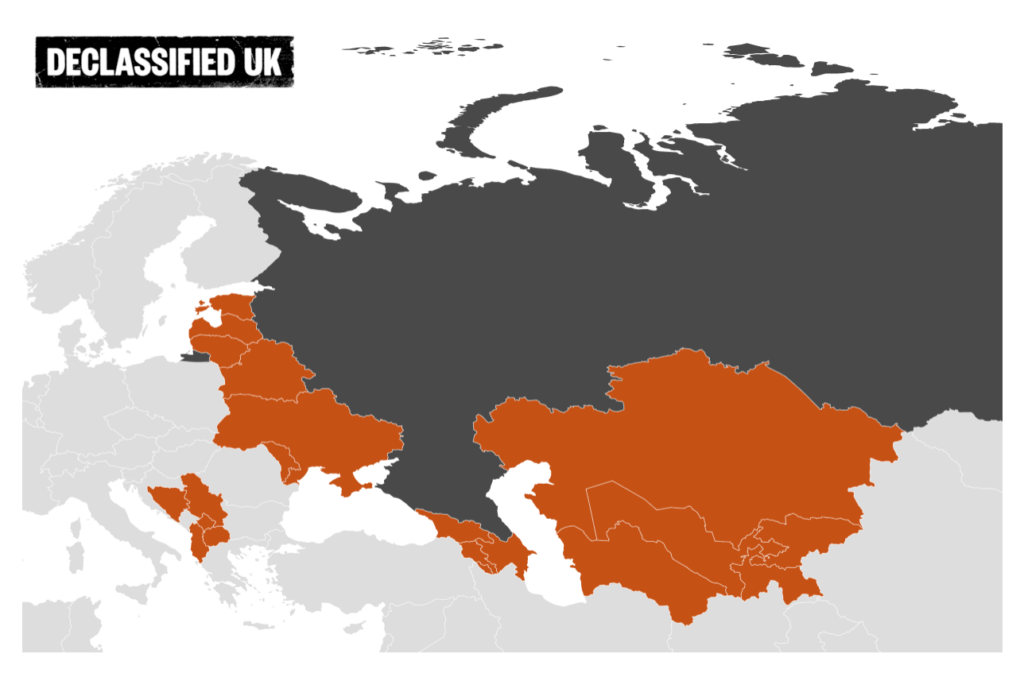UK Spends Over £80M on Media in 20 Countries Around Russia

All Global Research articles can be read in 51 languages by activating the “Translate Website” drop down menu on the top banner of our home page (Desktop version).
To receive Global Research’s Daily Newsletter (selected articles), click here.
Visit and follow us on Instagram at @globalresearch_crg.
***
The British government is spending tens of millions on media projects in Eastern Europe which are often presented as fighting “Russian disinformation”, but which may involve the UK’s own information operations.
The British government ploughed at least £82.7m of public money into media projects in countries bordering or near Russia in the four years to 2021.
The projects, which take place across 20 countries in Eastern Europe and Central Asia, are run through the Conflict, Stability and Security Fund (CSSF), a cross-government pot of money with the stated aim of preventing “instability and conflicts that threaten UK interests”.
The National Security Council, which is chaired by the prime minister, sets the fund’s strategic direction. But a parliamentary committee found the CSSF was “being used as a ‘slush fund’ for projects” which “do not meet the needs of UK national security.”
The findings come as tensions between Britain and Russia are high over Ukraine. The UK has accused Russia of planning to invade or launch a coup in Ukraine to install a pro-Moscow government.
Last month Britain began supplying the eastern European country with new anti-tank weapons. Some of the UK-funded media projects appear focused on Ukraine.

Britain is funding media projects in 20 countries (orange) bordering or near Russia (black). (Image: Datawrapper/DCUK)
‘Counter-disinformation’
The project most clearly directed at Russia is the Counter Disinformation and Media Development programme. It is run around Russia’s western border, from the Baltic States to Central and Eastern Europe, although project documents do not disclose specific countries.
It cost £60.4m in the four years to 2021.
The programme ”supports [the government’s] Russia Strategy’s objective to protect UK national security by reducing the harm to democracy and the rules-based international order caused by Russia’s information operations”.
It also “complements” the UK’s Ukraine Strategy – and appears to be focused on the country.
The project is likely part of the ongoing information war between Russia and Nato. The funds, UK documents note, aim to “understand and expose disinformation across the North Atlantic Treaty Organisation (Nato) space.”
The project was launched in 2016 and initially called the Russian Language programme. It sees the UK “work with a range of partners to enhance the quality of public and independent Russian language media”. It later expanded to include non-Russian language media.
The support to grantees includes “mentoring with UK media organisations”, “consultancy on programming” and “funded coproductions”. The UK is also supporting media outlets with “the collection of open-source information”.
The Foreign Office, which runs the programme, refused to give Declassified the names of media outlets that have received UK funds.
It also refused to name the UK media organisations that have been “mentoring” through the programme.
*
Note to readers: Please click the share buttons above or below. Follow us on Instagram, @globalresearch_crg. Forward this article to your email lists. Crosspost on your blog site, internet forums. etc.
Featured image: Communication towers in Ukraine. Britain financed the installation of 16 radio transmitters in eastern Ukraine to broadcast to Russia-backed rebel regions. (Photo: Anton Petrus / Moment)

